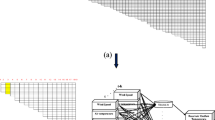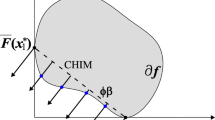Abstract
Operation of large-scale hydropower reservoirs is a complex problem that involves conflicting objectives, such as hydropower generation and water supply. Deriving optimal operational rules is a challenging task due to the non-linearity of the system dynamics and the uncertainty of future inflows and water demands. A common approach to derive optimal control policies is to couple simulation models with optimization algorithms. This paper in order to investigate the performance of a future reservoir and safely infer about its significance employs stochastic simulation, thus long synthetically generated time-series and a multi-objective version of the Parameterization-Simulation-Optimization (PSO) framework to develop uncertainty-aware operational rules. Furthermore, in order to handle the high computational effort that ensues from that coupling we investigate the potential of a surrogate-based multi-objective optimization algorithm, ParEGO. The PSO framework is deployed with WEAP21 water resources management model as simulation engine and MATLAB for the implementation of optimization algorithms. A comparison between NSGAII and ParEGO optimization algorithms is performed to assess the effectiveness of the proposed algorithm. The aforementioned comparison showed that ParEGO provides efficient approximations of the Pareto front while reducing the computational effort required. Finally, the potential benefit and the significance of the future reservoir is underlined.





Similar content being viewed by others
Explore related subjects
Discover the latest articles and news from researchers in related subjects, suggested using machine learning.Notes
Component Object Model Application Programming Interface
A MATLAB toolbox is available by Lophaven et al. (2002).
MATLAB Global Optimization Toolbox
References
Celeste AB, Billib M (2009) Evaluation of stochastic reservoir operation optimization models. Adv Water Resour 32(9):1429–1443. doi:10.1016/j.advwatres.2009.06.008
Černý V (1985) Thermodynamical approach to the traveling salesman problem: an efficient simulation algorithm. J Optim Theory Appl 45(1):41–51. doi:10.1007/BF00940812
Deb K, Agrawal S, Pratap A, Meyarivan T (2002) A fast and elitist multi-objective genetic algorithm: NSGA-II. IEEE Trans Evol Comput 6(2):182–197
Efstratiadis A, Koutsoyiannis D (2010) One decade of multi-objective calibration approaches in hydrological modelling: a review. Hydrol Sci J 55(1):58–78. doi:10.1080/02626660903526292
Efstratiadis A, Koutsoyiannis D, Kozanis S (2005) Theoretical documentation of stochastic simulation of hydrological variables model “Castalia”. Integrated Management of Hydrosystems in Conjunction with an Advanced Information System (ODYSSEUS), Contractor: NAMA, Vol. 3. Department of Water Resources, Hydraulic and Maritime Engineering – National Technical University of Athens, Athens, p 61
Efstratiadis A, Bouziotas D, Koutsoyiannis D (2012) The parameterization-simulation-optimisation framework for the management of hydroelectric reservoir systems. Paper presented at the Hydrology and Society, EGU Leonardo Topical Conference Series on the hydrological cycle 2012, Torino, European Geosciences Union
Efstratiadis A, Dialynas Y, Kozanis S, Koutsoyiannis D (2014) A multivariate stochastic model for the generation of synthetic time series at multiple time scales reproducing long-term persistence. Environ Model Softw 62:139–152. doi:10.1016/j.envsoft.2014.08.017
Forrester A, Sobester A, Keane A (2008) Engineering design via surrogate modelling: a practical guide. John Wiley & Sons
Giunta AA, Wojtkiewicz SF Jr, Eldred MS (2003) Overview of modern design of experiments methods for computational simulations. Paper presented at the Proceedings of the 41st AIAA Aerospace Sciences Meeting and Exhibit, Reno
Goldberg DE (1989) Genetic algorithms in search, optimization and machine learning. Addison-Wesley Longman Publishing Co., Inc.
Hamlet A, Huppert D, Lettenmaier D (2002) Economic value of long-lead streamflow forecasts for Columbia river hydropower. J Water Resour Plan Manag 128(2):91–101. doi:10.1061/(ASCE)0733-9496(2002)128:2(91)
Jin Y (2011) Surrogate-assisted evolutionary computation: recent advances and future challenges. Swarm Evol Comput 1(2):61–70
Jones D, Schonlau M, Welch W (1998) Efficient global optimization of expensive black-box functions. J Glob Optim 13:455–492
Kirkpatrick S, Gelatt CD, Vecchi MP (1983) Optimization by simulated annealing. Science 220(4598):671–680. doi:10.1126/science.220.4598.671
Kleijnen J (2009) Kriging metamodeling in simulation: a review. Eur J Oper Res 192(3):707–716. doi:10.1016/j.ejor.2007.10.013
Knowles J (2005) ParEGO: a hybrid algorithm with on-line landscape approximation for expensive multi-objective optimization problems. IEEE Trans Evol Comput 10(1):50–66
Knowles J, Nakayama H (2008) Meta-modeling in multiobjective optimization. In: Branke J, Deb K, Miettinen K, Słowiński R (eds) Multiobjective optimization, Vol. 5252. Springer Berlin Heidelberg, pp 245–284
Koutsoyiannis D (2000) A generalized mathematical framework for stochastic simulation and forecast of hydrologic time series. Water Resour Res 36(6):1519–1533. doi:10.1029/2000WR900044
Koutsoyiannis D (2005) Stochastic simulation of hydrosystems water encyclopedia. John Wiley & Sons, Inc.
Koutsoyiannis D (2011) Hurst-kolmogorov dynamics and uncertainty. JAWRA J Am Water Resour Assoc 47(3):481–495. doi:10.1111/j.1752-1688.2011.00543.x
Koutsoyiannis D, Economou A (2003) Evaluation of the parameterization-simulation-optimization approach for the control of reservoir systems. Water Resour Res 39(6):1170. doi:10.1029/2003WR002148
Krige DG (1951) A statistical approach to some basic mine valuation problems on the Witwatersrand. J Chem Metall Min Eng Soc S Afr 52(6):119–139
Labadie JW (2004) Optimal operation of multireservoir systems: state-of-the-art review. J Water Resour Plan Manag Asce 130(2):93–111. doi:10.1061/(asce)0733-9496(2004)130:2(93)
Larson S, Larson S (2007) Index-based tool for preliminary ranking of social and environmental impacts of hydropower and storage reservoirs. Energy 32(6):943–947. doi:10.1016/j.energy.2006.09.007
Lophaven SN, Nielsen HB, Sondergaard J (2002) Aspects of the Matlab toolbox DACE IMM-REP-2002-13, Informatics and Mathematical Modelling : DTU, pp. 44
Makropoulos CK, Butler D (2005) A multi-objective evolutionary programming approach to the ‘object location’ spatial analysis and optimisation problem within the urban water management domain. Civ Eng Environ Syst 22(2):85–101. doi:10.1080/10286600500126280
Nash J, Sutcliffe J (1970) River flow forecasting through conceptual models part I — a discussion of principles. J Hydrol 10(3):282–290
Nicklow J, Reed P, Savic D, Dessalegne T, Harrell L, Chan-Hilton A, Evolutionary ATC (2010) State of the art for genetic algorithms and beyond in water resources planning and management. J Water Resour Plan Manag Asce 136(4):412–432. doi:10.1061/(asce)wr.1943-5452.0000053
Oliveira R, Loucks DP (1997) Operating rules for multireservoir systems. Water Resour Res 33(4):839–852
Paraskevopoulos – Pangaea (1994) Environmental impact assessment for the wider region of the Greek Nestos River Basin
Press W, Teukolsky S, Vetterling W, Flannery B (1992) Numerical recipes in C: the art of scientific computing. Cambridge University Press, Cambridge
Razavi S, Tolson BA, Burn DH (2012a) Numerical assessment of metamodelling strategies in computationally intensive optimization. Environ Model Softw 34:67–86. doi:10.1016/j.envsoft.2011.09.010
Razavi S, Tolson BA, Burn DH (2012b) Review of surrogate modeling in water resources. Water Resour Res 48(7):W07401. doi:10.1029/2011WR011527
Reed PM, Hadka D, Herman JD, Kasprzyk JR, Kollat JB (2013) Evolutionary multiobjective optimization in water resources: the past, present, and future. Adv Water Resour 51:438–456. doi:10.1016/j.advwatres.2012.01.005
Sacks J, Welch W, Mitchell T, Wynn H (1989) Design and analysis of computer experiments (with discussion). J Stat Sci 4:409–435
Simonovic SP (1992) Reservoir systems-analysis - closing gap between theory and practice. J Water Resour Plan Manag Asce 118(3):262–280. doi:10.1061/(asce)0733-9496(1992)118:3(262)
Skoulikaris C, Monget M, Ganoulis J (2008) Climate change impacts on dams projects on transboundary river basins. The case of Mesta/Nestos river basin, Greece. Paper presented at the IV International Symposium on Transboundary Waters Management, Thessaloniki
Tsoukalas I, Makropoulos C (2013) Hydrosystem optimization with the use of evolutionary algorithms: the case of Nestos river. Paper presented at the 13th International Conference on Environmental Science and Technology, Athens
Tsoukalas I, Makropoulos C (2014) Multiobjective optimisation on a budget: exploring surrogate modelling for robust multi-reservoir rules generation under hydrological uncertainty. Environ Model Softw. doi:10.1016/j.envsoft.2014.09.023
Vink K, Schot P (2002) Multiple-objective optimisation of drinking water production strategies using a genetic algorithm. Water Resour Res 38(9):1181
Yates D, Sieber J, Purkey D, Huber-Lee A (2005) WEAP21: a demand, priority, and preference driver water planning model. Part 1: model characteristics. Water Int 30:487–500
YDE (1954) Nestos diversion dam, Macedonia, Greece, Basis of design on the Nestos diversion dam Knappen-Tippetts-Abbett-McCarthy engineers. Library of Technical Chamber of Greece, New York
Yeh WWG (1985) Reservoir managment and operations models - a state-of-the-art review. Water Resour Res 21(12):1797–1818. doi:10.1029/WR021i012p01797
Acknowledgments
This research was undertaken within the project “Investigation of climate change in Greece and its impact on the sustainability of projects dealing with hydroelectric power and the agricultural economy: Application in the Nestos river basin d KLIMENESTOS” which was financed by the Greek Ministry of Education, Lifelong Learning and Religious Affairs, General Secretariat for Research and Technology, through the National Strategic Reference Framework (NSRF) 2007–2013 and under the operational programmes “Competitiveness and Entrepreneurship and Regions in Transition”, within the National Action “Cooperation 2009”.
Author information
Authors and Affiliations
Corresponding author
Rights and permissions
About this article
Cite this article
Tsoukalas, I., Makropoulos, C. A Surrogate Based Optimization Approach for the Development of Uncertainty-Aware Reservoir Operational Rules: the Case of Nestos Hydrosystem. Water Resour Manage 29, 4719–4734 (2015). https://doi.org/10.1007/s11269-015-1086-8
Received:
Accepted:
Published:
Issue Date:
DOI: https://doi.org/10.1007/s11269-015-1086-8




